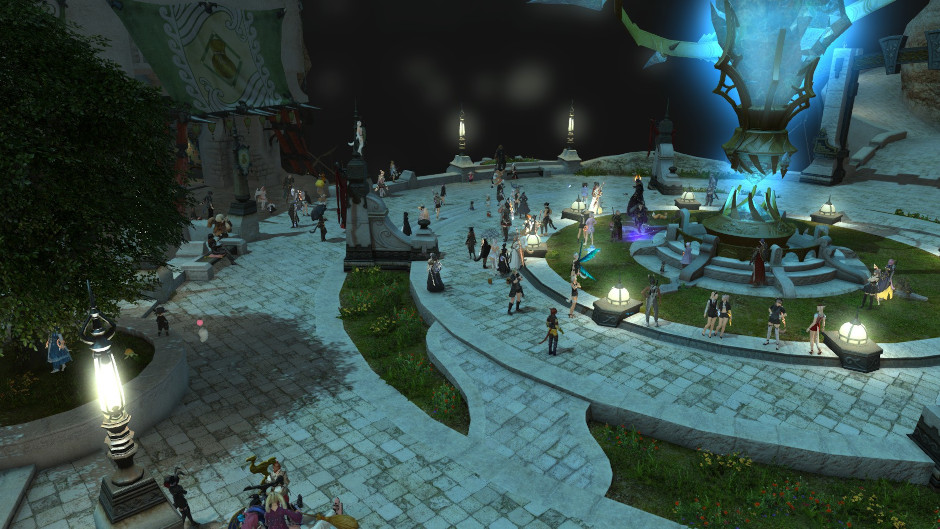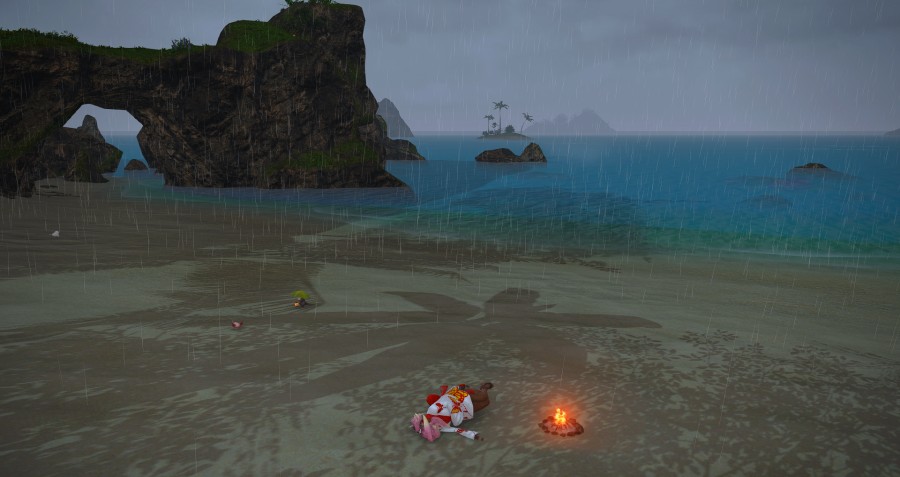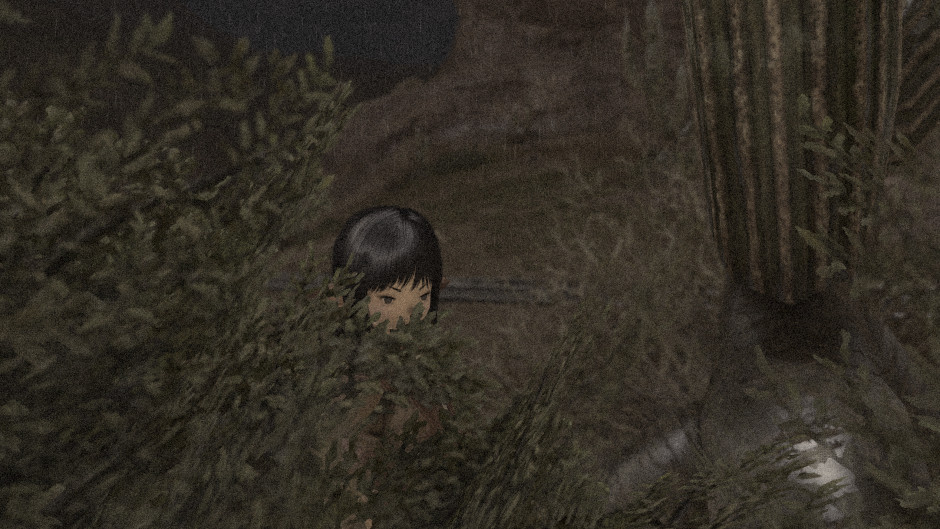Empires are powerful, expansive beasts that, despite their unfathomable size, somehow are able to expand and flourish under the right conditions. And even though they can seem like impervious giants, simple deterioration over time can cause calamitous ruin.
This is not necessarily inevitable, but as we cannot peer unto the ends of time, it can be taken as something of a steadfast rule, one that those in power should mind lest they join the ranks of the fallen.
Scholars are often conflicted about what truly happened to the Allagan Empire. Though possessing tomes and records that have been passed down through the ages or have miraculously resurfaced, the mysteries surrounding its demise are as vast as its purported reach during the height of its reign. There is one thing that they can agree on, and that is the undeniable evidence of their vastly superior technological advancements.
Even the Garlean Empire is but a burgeoning society when compared to the wondrous feats of the Allagans. And yet, with all their might and knowledge, they were unable to stave off the end.
Everyone, in some respects at least, fears the inescapable fact of finality. Unlike the lifespan of an individual, though, societies can adapt to changing times in a way that keeps them persisting much longer than those in them now might think possible. What is the secret to this rejuvenation? The answer is not so clear on its own, but by analyzing the pitfalls of other defunct groups, we can learn what to avoid and hope that the alternative path is more steady.
[Author’s Note: The following section will cover the decline of other MMORPGs and is therefore likely not going to be able to uphold a true sense of Roleplay immersion. I will do my best to keep everything under an FFXIV lens, but if this bothers you please skip to this section.]
Legends Of Kesmai
One of the most ancient tribes, those who believed in the Legends of Kesmai, were a proud people. They had crawled up from the underdeveloped mud of the Island of Kesmai to something of their own. And although what they had accomplished was impressive, their brief foray into the wider world exposed their inhabitants to other more powerful civilizations, such as those of Ultima and Lineage.
Citizenry can be fickle, and it was not long before the Kesmai had dwindled to only a few. They toiled away to make the best of the rudimentary offerings of their world until they were overtaken by a benefactor who was anything but beneficial. Within a year of this new leadership, the remnants of the Legends of Kesmai were dissolved entirely.
While this particular group is no longer around, many of its contemporaries from the era are still clinging to existence, albeit in much smaller capacities than at the peaks of their time. Those of places like Tibia, Ultima, The Kingdom of the Winds, and even Meridian 59 maintain strong communities but are now more akin to hamlets or villages at best.
Once proud giants, they remain only in smaller services to their smaller but tight-knit citizens. The people there are not interested in the advancements of others, instead content to remain in the company of those they have known their whole lives, even if it means living in relative squalor and being restricted to an unchanging world.
However, others were less fortunate, and in the ever-changing landscapes of new vistas, simple missteps can lead to dire circumstances. Take the settlers of Tabula Rasa, for instance. While not a long-lived society, the blip it made was noticeable in its time. The immigrants who remember its achievements still lament its downfall as much as they cherish the time they had there. While a bountiful place, it failed to incentivize those that passed through to stay. There was little to do and with minimal outlets, many abandoned it.
To make matters worse, one of the founders and architects was forcibly removed from his position in a deceptive manner by a shadowy upper echelon which hindered faith from the populous. The dwindling few that stayed loyal fought to the end. Even with the flames of this fast-burning fire quickly extinguishing, those in power did their best to provide the people with extravagant parties and musics to reward them for their efforts. But it was too late to make a difference and they crumbled into obscurity.
Looking back, we can pick out some indicators of what might lead to the end of eras. The lands of old seemed to fall due to their inability to keep up with the capabilities of their contemporaries, suffering from technological stagnation. Newer, more appealing lands would surely be the choice for settlers seeking a comfortable quality of life. And in our previous example, it was discontent with the lack of content that drove people to find something new.
While leadership decisions play roles in every decline, it is far too broad a topic to really pinpoint any useful information. For now, we can say that it is generally expected that people want something that follows their ideas of what should be modern, they want to enjoy the company of those they live with, and they want to have meaning to their existence. We must consider, though, the possibility of an overabundance of any of these traits.
A Galaxy Far, Far Away
Take the Galaxian people, famed for their involvement in the so-called War of the Stars. They enjoyed a time before the standardization of what residents came to expect before the establishment of the realms of Azeroth, a time of bountiful freedom in spite of some limitations in advancement.
Their society boasted vast lands that allowed the citizenry to colonize as they saw fit, establishing townships and local governments of their own. Many took to the joys of ordinary life, while others were able to quench their thirst for adventure. This would not last, however, as certain demands would strain the will of the people to continue.
Their rulers decided to establish a special warrior order that was, when introduced, exceptionally exclusive. Joining these ranks was so difficult, in fact, that it was estimated the first to assume the mantle would not do so for nearly a decade. This process was expedited, allowing for a few to finally achieve this new title.
Others became jealous, and it was not long until much of the citizenry eschewed their passions and work to pursue the same path. And when Azeroth was established, facing fears many would leave, the trials were cut entirely, while the structure of their world was haphazardly conformed to fit something more like this new juggernaut empire.
Many felt as though their efforts had been in vain when these changes took effect, while others lamented the new lack of freedom that suddenly befell them. Riots and protests were widespread until eventually, the entire society was no more.
If not enough to do is a death knell, and too much to do can be just as devastating, what can help a society to flourish? It would seem as though a simple misstep can drastically affect the health of the land, though this is using hindsight. In reality, the road to ruin is often a slow and gentle decline. While the main cause for collapse can be distilled as either poor or excessive change, or even lack thereof, we can measure what is needed through the health of the community. So how is ours faring?
Our people are very fortunate to live in a time of abundance. Disciples of both Hand and Land have countless opportunities to perfect their respective trades, and we have a healthy economic landscape, though for certain goods prices can fluctuate to extremes on both ends.
This is not a bad sign, though, as shifting supply and demand indicates an active marketplace. For adventurers, there is always some challenge or another to take on, be it through newly discovered lands or even in helping those newer to that side of things take on their own trials and tribulations.
Ups and Downs
When we look at the social aspects, it would be difficult to say that there are no rough patches. Many loud actors have caused a commotion in certain circles, and there have been calls to put an end to various activities that announcers screech about ad nauseam with pages of advertisements for the services of the establishments they represent. The sheer volume of these cries to entice patrons has been off-putting to many, with some putting the very thought of ever going to a shop out of their minds entirely.
However, there are hopeful signs that this soon may change. As mentioned, the market here is healthy, and that goes beyond the measurement of goods sold between people. Those providing services are also beginning to adjust with the goal of filling the many niche needs that the avalanche of nightclubs has left untouched.
While there is no denying that the DJ club scene has an extensive following, it would be unfair to turn a blind eye to the obvious disconnects this side of venue operations has with a large portion of the world.
Only a few months ago, finding a spot that relied on more traditional modes of operation was a rarity, with only a handful opening each week. Of these, it was even more uncommon for them to stick around beyond the first few openings. And yet, as large as the competition is, the yearning for a less bombastic performance broadcast has amplified, resulting in a more diverse selection for prospective clientele who want to simply relax, chat, and maybe listen to a bard or two.
If it was not immediately apparent, the homogenization of things to do can be disastrous for a community, so the re-emergence of a variety of social gatherings is a welcome sign that will surely give a much-needed rejuvenation to what has been a somewhat stagnant landscape.
As a whole, our society is one that remains strong. There have been some warning signs that have given cause for concern, but thankfully the bonds of comradery have persevered, preventing a potential loss of interest for the inhabitants of this world. We are not necessarily in a position to rest on our laurels, so to speak, so we must remain vigilant and attentive to what is going on.
Our leaders continue to pay attention to the needs of the people, and we are hopeful for more exciting developments to come in the near future. In the meantime, we must remember that we also play a role in this. We should be kind to one another, respect our differences, be open to change, and be willing to be the change at certain times.
Not everything will be easy, but if we all continue to grow with each other, we can help to sustain a world filled to the brim with delights for all.







